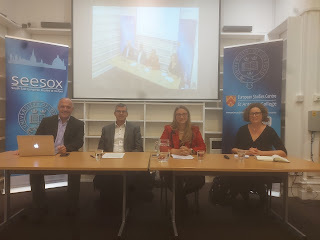The main speakers presented their work on the dehumanisation of refugees (Düvell) and the securitisation of migration (Kale). Düvell had started to think about the dehumanisation of refugees after having visited the migration centres in 2013. He began writing in 2015 after conducting fieldwork in the Greek islands and the Aegean coast of Türkyie. To understand the hostile responses to migration after the 2015 crisis, Düvell compares the response of the European Union (EU) to this crisis with the response of European countries to the migration of Eastern European Jews during the 1920s. He argued that there are important parallels between the policies of the EU after the 2015 crisis with those of the European countries in the 1920s, as well as between the narratives of refugees that were constructed in both cases. In both cases, the Jewish refugees Jews in the 1920s and those coming to Europe from Syria and other Middle Eastern and African countries were considered as invaders and were confined to camps. Refugees described their experiences in both cases in similar ways. They emphasised hunger, lack of medical treatment, poor sheltering conditions, and mistreatment by the police or the army upon their reception. Alongside these policies, in both cases there was a dehumanisation process at play, whereby a boundary marked the “in-group” and the “out-group”. The refugees – the outsiders – were stigmatised as a threat to the “in-group”. They were thus considered as subhuman to enable the indifference to their suffering and the denial of their rights. Düvell argues that this process is part of a deterrent policy to stem the flow of refugees and represents a new typology of evil.Kale’s presentation focused on the securitisation of migration by the EU, the use of the deal with Türkyie to make its securitisation process more effective, and some of the key actions taken by the EU to stem the flow of refugees from the Middle East and North Africa. She traced the policy of securitisation to the EU’s border control regime, and argued that in the 1980s and 1990s that the control of the external borders became an important part of the freedom of movement within the Union. This led to the eventual association of border control with migration. Although the EU started to experience an influx of refugees after the Arab Spring in 2011, the EU border crisis and its subsequent securitisation occurred in the summer of 2015 mainly due to the increase of asylum seeker, which had been double that of the previous year. The EU then responded through its deal with Türkyie to stem the flow of refugees arriving from Syria and other Middle Eastern countries, set in place an action plan that entailed the deployment of dedicated maritime task forces to counter migration in the Mediterranean, and established hot spots in frontline Member States such as Italy and Greece to process the asylum claims. According to Kale, the EU-Türkyie deal served to test the measures that were successful or not successful – from the EU’s perspective – and use them in other places where the EU had similar interests to prevent migration. She further argued that the deal has externalised the EU’s migration policy and has acted as a deterrent by signalling to refugees both in their countries of origin and in transit countries that the EU does not intend to take in more refugees.
Briddick discussed mainly the legal tools that are used in the securitisation process. She discussed some of the provisions of the UK’s Illegal Migration Act and the EU’s response to refugees from Syria compared to those from Ukraine. She underscored that the powers given by the Illegal Migration Act to the Home Secretary to deport and the provisions barring asylum claims even on the basis of international protection even for victims of trafficking are justified based on a securitisation discourse. The justifications for such provisions refer to “extraordinary circumstances” – that is the high number of people arriving by boat, the pressure they put on public services, and the public concerns of these arrivals. She also highlighted the use of a different legal practice by the EU – namely the activation of the Temporary Protection Directive – in the case of Ukrainian refugees, which allowed them to freely travel and settle in the EU. According to Briddick, this “demonstrates how states and groups of people find it easier to provide shelter to people with cultural and linguistic affinity” and the neglect associated with refugees of a different race or cultural background.
The discussion and question and answer sessions explored further the issue of the EU’s response to the 2015 refugee crisis and the Ukrainian refugee crisis in the wake of Russia’s invasion in February 2022, discussed the legal aspects of defining refugees and asylum seekers, as well as the important role played by NGOs in providing the necessary support infrastructure for the refugees.
by Alban Dafa (ESC Research Assistant)

No comments:
Post a Comment